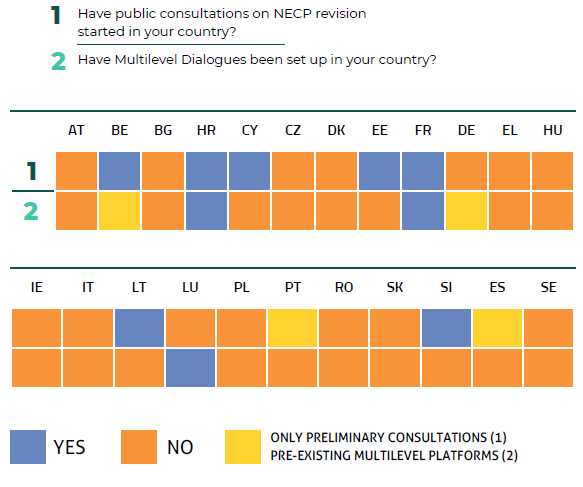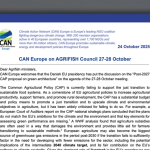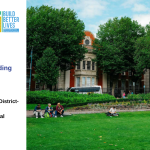The EU will not reach climate neutrality by accident nor without thorough planning. National Energy and Climate Plans (NECPs) are a central strategic tool in this regard, laying out key reforms at national level for achieving climate and energy targets, mobilising crucial investments and reacting to the fossil energy price crisis.
Planning the fundamental reforms that will directly affect the ways of life of millions of European citizens cannot take place in an ivory tower. Given the scale and pace of climate action that is required, citizens and stakeholders must be consulted and participate meaningfully in the elaboration of NECPs – or else society will not consent to the proposed measures.
According to the Governance regulation and the Aarhus Convention, Member States must organise early and effective public consultations prior to the submission of draft and final NECPs. They must also establish a Multilevel Climate and Energy Dialogue to discuss energy and climate policies, including NECPs. However, our country-specific analysis of 23 Member States[1] reveals widespread deficiencies in the application of these public participation rules – less than four months prior to the submission of NECPs.
There are still opportunities for national governments to respect their legal obligations and offer citizens a chance to meaningfully engage in the planning of fundamental decisions affecting their lives. WWF and CAN-Europe urge Member States to organise public participation processes on the revision of their NECPs, and call on the core public participation principles set out below to be applied:
- Before the public consultation and Dialogue take place:
- Draft revised NECPs must be made available to the public – so that they can engage meaningfully in the policy debate.
- The public consultation and the Dialogue must include all relevant stakeholders, through a dedicated website, proactive advertisement and invitation. Dialogues in particular should convene local, regional and national stakeholders.
- On the design of the public participation processes:
- The public consultation and the Dialogue must take place sufficiently in advance so that the feedback may be integrated in policy documents, with minimum durations enabling participants to express their views.
- Public consultations must be formulated with open questions and multiple choice questions representing a diversity of views, including options which substantially differ from the Member State’s initial proposal.
- Multilevel dialogues must cover both policy scenarios and the status of implementation of NECPs – for which EU countries should have submitted progress reports by 15 March 2023. Their structure and purpose should be clear from the outset.
- Following the public consultation and dialogue:
- Both the draft revised and the revised NECPs must include a summary of the public participation processes that have been organised, with a list of the participating stakeholders, a summary of the views expressed and the extent to which the Member State integrated these views in the NECP submitted to the European Commission.
Public consultations: civil society evidence
According to Articles 9(4) and 10 of the Governance Regulation, each EU Member States “shall ensure that the public is given early and effective opportunities to participate in the elaboration” of both draft and final NECPs. Sufficient information must be provided, including the draft NECP – and with reasonable timeframes for the public to participate. The NECP submission will have to contain a “summary of the public’s views or provisional views”. In its Guidance to Member States for the update of NECPs, the Commission recommended that Member States set up a dedicated consultation website and ensure that the public has access to all relevant documents, reports and assumptions from the start of the consultation period.

Our analysis, conducted less than four months prior to the submission of draft final NECPs to the Commission, reveals widespread inaction on the part of Member States – with 14 out of 23 EU Member States surveyed failing to even start any form of public consultation on NECPs. While public consultations – at least in the form of a preliminary survey – have started in Belgium, Croatia, Cyprus, Estonia, France, Lithuania, Portugal, Slovenia and Spain, in many other countries they were delayed (e.g. Czechia), are expected as upcoming but with uncertain timelines and formats (e.g. Ireland, Luxembourg) or have simply not been announced at all (in 10 countries: Bulgaria, Denmark, Germany, Greece, Hungary, Italy, Poland, Romania, Slovakia, Sweden). On several occasions, respondents highlighted the impossibility to speak to their respective national governments, despite numerous efforts (e.g. Denmark, Poland).
Even for those countries which initiated a public consultation, quality varies greatly. Spain and Portugal only organised preliminary consultations, during which they did not provide respondents with a draft version of the revised NECPs. In Spain, the Ministry for the Ecological Transition has only announced a public debate in early April on the NECP revision, but did not specify how it will be structured and who will be invited to participate.
Even where broader consultations have started already, draft NECPs have largely not been made available, including in France, Cyprus and Croatia. France organised online panels, but with no draft revised plan and only tackling the energy dimension of NECPs. Cyprus organised a 3-month online consultation, but asked for comments based on the previous NECP round, thereby raising questions on the meaningfulness of the exercise. In Croatia, while the approach of the relevant Minister towards stakeholders has been positive so far, a draft text is not yet available, and the Ministry does not have capacity to organize a wide public consultation including all the relevant stakeholders at once.
In Slovenia, formal consultations have just started (April 3). While their effectiveness remains to be seen, the planned format and timeline – already available on a webpage – seems more promising than in many other countries, as they include a public presentation, online consultations (roughly 1 month) and six targeted issue-based consultations.
Of the 23 countries surveyed, as of March 2023 only Lithuania seems to have already conducted a proper consultation, taking over nine months between 2021 and 2022 and involving government officials, relevant stakeholders and civil society members through five meaningful thematic working groups. An NECP webpage was created, and draft sections of the revised NECP were shared. Once finalised, the complete draft NECP is expected to be submitted once again for a final public consultation.
Multilevel climate and energy dialogue: civil society evidence
According to Article 11 of the Governance Regulation, “each Member State shall establish a multilevel climate and energy dialogue pursuant to national rules, in which local authorities, civil society organisations, business community, investors and other relevant stakeholders and the general public are able actively to engage and discuss the different scenarios envisaged for energy and climate policies”. NECPs should be discussed in the framework of these dialogues. In its Guidance to Member States for the update of NECPs, the Commission recommended that the dialogues also discuss the scenarios for achieving climate neutrality, and that the NECP submission contains a summary of the public’s views.
In 18 out of the 23 surveyed EU Member States (Austria, Bulgaria, Cyprus, Czechia, Denmark, Estonia, Greece, Hungary, Ireland, Italy, Lithuania, Poland, Portugal, Romania, Slovakia, Slovenia, Spain, Sweden), such national dialogues have simply not taken place yet. In two of these countries (Bulgaria and Greece) structures serving the purpose of Multilevel Climate and Energy Dialogues are foreseen, but they were not operational at the time of responding to the survey. Only two of these countries have officially planned a first dialogue in the coming months, before the draft NECP is submitted (Portugal and Romania, both as part of the NECPlatform project).
In 2 of the 23 countries surveyed, national structures for multilevel climate policy-making between federal, regional and local level already existed (in Belgium and Germany), and therefore no further ad hoc platforms were necessary. However, while in Belgium the NECP revision process is inherently part of such multilevel climate policy-making structure, in Germany such structures have not discussed NECPs so far, and respondents do not expect this to happen in the future.
In the end, a platform hosting the Multilevel Climate and Energy Dialogue has only been officially set up and activated in three of the countries surveyed: Croatia, France and Luxembourg. In Croatia the process, organised in cooperation with the NECPlatform project, is still in its early stages. In Luxembourg, the platform was not considered by respondents as a space allowing for meaningful discussion or work. In France, an already existing consultation platform hosted climate and energy roundtables with a wide range of stakeholders (including local authorities and NGOs) around the national Climate and Energy Law, which will largely feed into the NECP revision process. Such roundtable discussions were organised on a sectoral basis: e.g. farming, energy, finance, transport. However, no drafts were made available to stakeholders.
[1] 35 national civil society organisations across the CAN-E and WWF network were surveyed across 23 EU Member States: Austria, Belgium, Bulgaria, Croatia, Cyprus, Czechia, Denmark, Estonia, France, Germany, Greece, Hungary, Ireland, Italy, Lithuania, Luxembourg, Poland, Portugal, Romania, Slovakia, Slovenia, Spain and Sweden.
CHECK THE FULL REPORT FOR FURTHER DETAILS.



